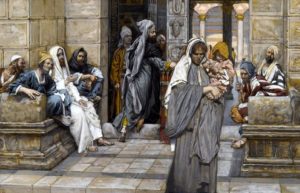Thoughts on Sunday’s Lessons for Nov. 11, 2018

Le denier de la veuve (The Widow’s Mite). Watercolor painting on graphite (1886-1894) by James Tissot (1836-1892). The Brooklyn Museum.(Click image to enlarge.)
First Reading (Track One): Ruth 3:1-5; 4:13-17
In the midst of the Old Testament books that tell the story of Israel and its kingdom – tucked in between Joshua and Judges, Samuel and Kings – we find the short, charming book of Ruth. This is a love story about Ruth, a young Moabite widow, who follows her beloved mother-in-law, Naomi, back home to Bethlehem after Ruth’s husband’s death. Through a bit of trickery suggested by Naomi, Ruth persuades her kinsman Moab to marry her, and they have a child named Obed. Why is this little story placed in context with the books about Israel’s kings? The final verses reveal the rest of the story: Obed will be the grandfather of King David, and thus he and his parents are in the genealogical line of Israel’s Messiah.
First Reading (Track Two): 1 Kings 17:8-16
Sunday’s readings begin with the story of a poor widow who answers a difficult call from Elijah; and they end with Mark’s story about a poor but generous widow who gives all that she has to the Temple treasury. God cares for widows, the weak, the stranger and the oppressed, and we are called to do the same. In our first reading, we hear of a widow who trusted God’s promise and fed Elijah out of her meager fare, even though she had so little to eat that she believed she and her son would soon die of starvation. God provides, and her bit of oil and meal prove enough to feed everyone and to last until the drought ends.
Psalm (Track One): Psalm 127
Psalm 127 delves into ideas of maintaining home and family consistent with the story of Ruth. In the ancient Near East, it was difficult for a family to survive without strong sons to build the home, grow crops, and protect the family from invaders. Sons like these are gifts that can come only as a blessing from God, says the Psalmist. God builds the house, watches over the city like a watchman keeping vigil, and provides children as a gift to God’s people, a quiver full of God-given arrows to help protect against enemies.
Psalm (Track Two): Psalm 146
“Praise God, O my soul!” This ringing hymn of praise begins the first of the final five Psalms, concluding the book with powerful songs of exultation in God’s greatness. But after the first joyous verse its tone shifts to a theme of caution: Take care, for while God can always be trusted, earthly rulers cannot. We can count on God, our creator, to give hope to widows and orphans; help for the poor, justice for the oppressed, freedom for the prisoner, and help for those who are disabled, to those who are alone, and to strangers in strange lands. This is the pledge of God’s covenant with the people through Abraham, Noah and Moses, and they remain the priorities that Jesus taught about the Kingdom of Heaven.
Second Reading: Hebrews 9:24-28
Hebrews continues in its extended discussion of the differences between the eternal sacrifice of Jesus against the more transient sacrifices of the old Temple’s earthly high priests. The earthly high priest was required to return to the sanctuary annually to atone for his sins, repeating an animal sacrifice over and over again “with blood that is not his own.” But Jesus, having borne the sins of many, will appear a second time, not to deal with sin – that has already been done in Jesus’s sacrifice once and for all – but to save his faithful people.
Gospel: Mark 12:38-44
Jesus has arrived in Jerusalem on his final journey, and he is challenging the religious and political establishment in ways that will turn them angrily against him. First he scorns the scribes for their arrogance and hypocrisy, mocking them for flaunting their wealth and power with ostentatious dress and prayer while they “devour widows’ houses.” Then, as Jesus sits near the Temple treasury, watching believers make their donations, a poor widow appears. She has little, but in contrast with the scribes, she gives two small coins: all that she has. Jesus praises her, not for giving all that she had, but because she gave it from her heart. It was not the quantity but the quality of her giving that matters.
What are “Track 1” and “Track 2”?
During the long green season after Pentecost, there are two tracks (or strands) each week for Old Testament readings. Within each track, there is a Psalm chosen to accompany the particular lesson.
The Revised Common Lectionary allows us to make use of either of these tracks, but once a track has been selected, it should be followed through to the end of the Pentecost season, rather than jumping back and forth between the two strands.
For more information from LectionaryPage.net, click here.
